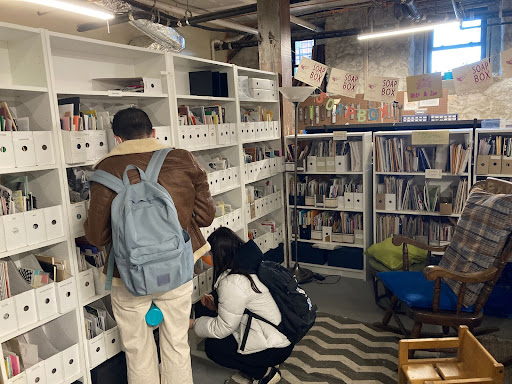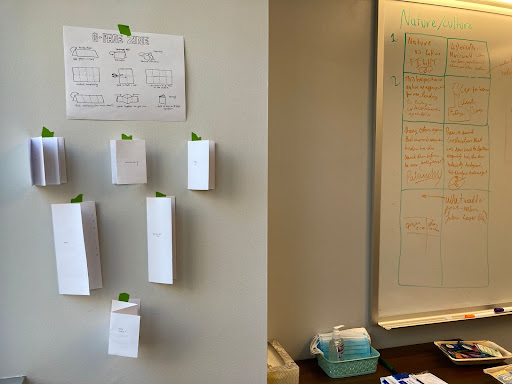The Climate of Concepts: Zine Library
November 9, 2022
In this Field Note from PPEH 2021-22 Postdoctoral Fellow Nandita Badami she shares student work and reflections from her Spring 2022 class, "The Climate of Concepts: How Words Build Worlds." Read on to learn about how this interdisciplinary work led to student-created zines, and more.
In Spring 2022, I offered an independent study titled “The Climate of Concepts: How Words Build Worlds.” My students and I explored a series of words frequently encountered in the Environmental Humanities (with weeks dedicated to “nature”, “wilderness”, “the environment”, “ecosystem”, “conservation”, “the climate”, “the anthropocene”, “the planetary”, amongst others). The idea was to think about their climate: their theoretical meaning, the historical contexts in which they first took on the ideas we now associate with them, and the political ends to which they are mobilized in the contemporary moment.

We addressed what the words mean, what they don’t, how they have been used in the past, and, in some cases, how we might use them differently in the future as we negotiate complex realities. The course was resolutely interdisciplinary: we combined readings from anthropology, geography, the history of science, comparative literature and informatics. The aim was to develop robust tools to navigate the shifting landscape of “knowing” in the context of climate change, informed by the politics of concepts and their histories.
In addition to the usual expectations (readings, class discussions, and a final paper), I invited the students to complete an open-ended “zine assignment.” The prompt was to make four zines that spoke broadly to the concepts covered in any four weeks of the semester, as a means to accomplish a series of teaching and learning goals. The first of these was to allow for engaged, creative, expansive exploration, introducing an element of interdisciplinary praxis into an otherwise abstract and concept-heavy class. Second, the students were encouraged to relate class concepts to their existing interests, even if these did not at first seem directly relevant. The third goal, following from the above, was to use the zine format as a means to revise, consolidate and integrate concepts encountered in class: goals often performed in more conventional formats by midterm and final exams. Finally, the zines offered an avenue for creative self expression through a format that acknowledged how sometimes both conceptual connections and our ability to express them exceed the forms and formats of conventional academic presentation.
In practice, zine work was accompanied by a series of scaffolded assignments, field visits and workshops. The first of these, a smaller “image assignment”, ran every week. The students were asked to engage with the weekly readings by collecting two or three “before/after images”: the “before” images were to represent what they thought the concept for the week meant going just by the title, the “after” images were to be curated after engaging with the readings, and represented the conceptual nuance at stake in the scholarship. We began each class reflecting on these differences — what the students assumed a concept to mean, and the effect of engaging with them through either a historicization and politicization of those concepts. The image assignment helped ground complex abstract ideas each week, while also building an image library that encouraged the students to think about concepts visually. This worked to anchor a different grammar of expression that could be channeled into the zine assignment, if they chose.
Second, the students and I took a field trip to The Soapbox Community Print Shop and Library, located on Kingsessing Avenue in West Philadelphia, a short walk away from the Penn campus. We spent more than an hour perusing, reviewing various zines for their content, styles and formats. Third, PPEH’s own Angela Faranda came in to speak to the students about the technicalities of zine making, and taught us the classic folds. Lastly, we also devoted class time to zine-brainstorming and zine making.

What emerged was a truly collaborative space, where the students engaged with class concepts while integrating them with their existing interests, interpreting the relevance of the concepts they were encountering in class to the issues uppermost in their minds.
What follows is a series of video presentations of the first ever “The Climate of Concepts Zine Library”, by Mary Shin and Carlos Montes, produced in April 2022, accompanied by their artist statements. While I have asked them to write a short “artist statement” to accompany their zines for presentation on this blog, the goal of these statements is not explication. These zines speak for themselves. The best way to engage with them through this blog is to press pause on the video each time a page is turned, to read the content. If you would like to flip through them in person, you will find them at the PPEH office and The Soapbox Zine Library.
Mary Yoonju Shin
After learning about various concepts in environmental humanities in this course, aptly titled “The Climate of Concepts: How Words Build Worlds,” I felt compelled to create zines that reflect both what I have learned and what I want to know more about. I wanted my zines to be educational, thought-provoking, and also argumentative, through which I challenge and restructure ideas that are considered “normal” or “typical.” I used a variety of materials including colored pens and pencils, watercolor paint, and post-it notes for my writing and illustrating.
I wanted to create zines with images and words that would urge people to rethink their notion of what these concepts mean. My zine titled, “The Climate of Concepts: A Lexicon,” functions as a mini dictionary in which I define and deconstruct six terms that we learned about during this class. In “Urban Nature, Human Infrastructure,” I hope my audience will reflect on the human’s role in changing the face of the Earth and also think deeply about what “nature” actually entails. In “Nature <> Culture: Space for Woman and Her Body,” I challenge the expectations that have consistently burdened women and the standards that define their value by their reproductive capabilities. I question the responsibility of women’s bodies as an environment and create space for thinking about how to support women to feel comfortable in their own skin. Finally, in my fourth zine titled “Consent,” I present how we can apply this concept of consent to not only our interpersonal relationships with other people, but also our relationships with the environment.
Throughout this project, I found creative comfort and agency in expressing my thoughts and feelings on paper. I hope my zines help others resituate and rethink these common ideas. I hope we can collectively see how we take words for granted if we do not slow down and carefully parse out what we mean when we say them. Thank you.
Carlos Montes
This collection of zines is not what I had imagined when I initially brainstormed topics. I was imagining complicated theories, academic-ese, citations (Chicago-style). As one of my first experiences producing creative materials in college, it took me a while to get out of the academic mind that urged propriety and respectability. But, given that most of my themes deal with queerness, would that not be counterproductive to my point? I opted to be irreverent, provocative, and somewhat blasphemous, and I could not be happier with the results.
In these zines there are serious condemnations to American imperialism, settler-colonialism, and Western masculinity, at the same time as there is a whole cruising manual. However, these are not in contradiction, but rather represent an affront to normativity in all its forms, whether that be propriety standards and the patriarchy, or neoliberalism and colonialism.
These pages gave me the opportunity to value my own experiences as a valid source of insights with the same weight as any peer-reviewed article. It also helped me experiment with other methods of delivering this information that, once again, are just as valid as a written article. Taking the lessons from this assignment, I will be looking for ways to incorporate zines into my future projects.
Resources
History of the Zine
UNC Chapel Hill Library: A Brief History of Zines
Cornell University Library: Books about Zines
Zine Making Resources
The Creative Independent: How to Make a Zine
My Modern Met: How to Make a Zine
Zine Libraries
Online Zine Library at the Internet Archive
Zine Libraries across the world
Zine Teaching Resources
Lesson Plans and Reading Lists from Barnard College Library
The Climate of Concepts Syllabus
Please reach out to Nandita Badami at nbadami@uci.edu if you are interested in The Climate of Concepts syllabus, or would like to chat about experiences integrating multi-modal assignments into syllabi!
